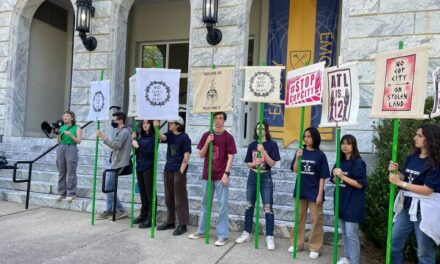Two Robert W. Woodruff Scholars, College senior Noam Kantor and College alumna Emilia Truluck (16C), were named 2017 Marshall Scholars. This is the second year that Emory has had two Marshall Scholars in the same year, the first being in 1967.
Next year, Kantor and Truluck will attend the University of Oxford, England, where they will pursue master’s degrees in mathematics and in refugee and forced migration, respectively, according to Megan Friddle, director of the National Scholarships and Fellowships Program in the Office for Undergraduate Education. Truluck said she plans to use the second year of her scholarship to pursue an additional master’s in gender and sexuality studies at the School of Oriental and African Studies in London.
“It was pretty hard to believe,” Truluck said. “I’d been unsuccessful [in getting] the Marshall Scholarship] last year, so I kind of went into it this year thinking, ‘OK, if I don’t get it this year, it’s just not meant to be, but I need to give it one more shot.’”
Kantor shared similar sentiments of surprise when he received the news and said he looks forward to the academic opportunities that lie ahead in the U.K.
Kantor, a 2015 Goldwater Scholarship recipient, is currently pursuing dual bachelor’s and master’s degrees in mathematics at Emory, and will graduate this spring. Truluck, currently on a Fulbright Scholarship in Jordan, double majored in Middle Eastern Studies and Women’s, Gender and Sexuality Studies.
The Marshall Scholarship aims to foster U.K.-U.S. relations by providing funding for U.S. recipients to pursue graduate studies at any accredited U.K. university, according to its website. Of the 947 applicants who applied this year, 32 students were selected.
Applicants need a minimum cumulative GPA of 3.7 and must submit recommendations and essays for internal review by a committee of Emory representatives from various disciplines, according to Friddle. The committee includes one U.K. representative and one previous Marshall Scholarship recipient, both of whom are Emory-affiliated, Friddle added.
“[At] Emory, the competitiveness varies from year to year,” Friddle said. “Each student is evaluated based on their own academic achievement, leadership and service, [as well as] their ability to explain why the experience in the U.K. is important to them academically [and] professionally.”
Upon completing her studies in the U.K., Truluck said she hopes to work in the international humanitarian aid sector. During her time at Emory, Truluck volunteered with New American Pathways, a Clarkston, Georgia, organization that provides resources and services to refugees, which inspired her to work for a Savannah, Georgia, refugee resettlement agency Summer 2016.
Truluck developed a close bond with Women’s, Gender and Sexuality Studies Professor Pamela Scully, whom she turned to with frustrations about Emory and the way campus discussions treated situations in the Middle East.
“There’s a misunderstanding on campus about things that happen in the Middle East and about people from the Middle East,” Truluck said. “I don’t necessarily think that Emory is uniquely bad in this way … [but] when you sat down and talked to people, the discussion was usually proactive and people were willing to listen.”
Kantor said he ultimately wants to become a mathematics professor. When Kantor began taking graduate-level mathematics courses his sophomore year, he felt discouraged because he was measuring himself against graduate students, but realized “there are always people who are going to be learning faster than you, and you need to figure out how to learn best, to not measure yourself against other people.”
Wake Forest University Associate Professor of Mathematics Jeremy Rouser, who oversaw Kantor’s number theory research paper as part of Wake Forest’s Research Experience for Undergraduates Summer 2015 program, noted Kantor’s exceptional collaborative skills, citing his eagerness in “sharing [his] insights and helping other people who didn’t have the insights to understand the importance and significance of what they were doing.”
Associate Dean of the Chapel and Religious Life Lisa Garvin, who wrote recommendations for both students, believes that they will be future leaders in their communities.
Garvin praised Kantor’s ability to “lead others with kindness and good humor [and challenge] the community and those around him toward a more hopeful future.”
Garvin said she knew Truluck as a deacon in the University’s worship community for four years.
“Emilia is poised to change the world: she is passionate and compassionate, she’s tenacious and shows a depth of intellectual curiosity,” Garvin said.
Michelle Lou and Brian Savino contributed reporting.
alisha.bhatia.compton@emory.edu | Alisha Compton (19C) is from Chantilly, Va., majoring in neuroscience and behavioral biology and English, with a concentration in creative nonfiction. She previously served as Emory life editor. In addition to the Wheel, she is an undergraduate research assistant at the Grady Trauma Project, a member of the Survivor Anthology and a sister of Gamma Phi Beta sorority.




